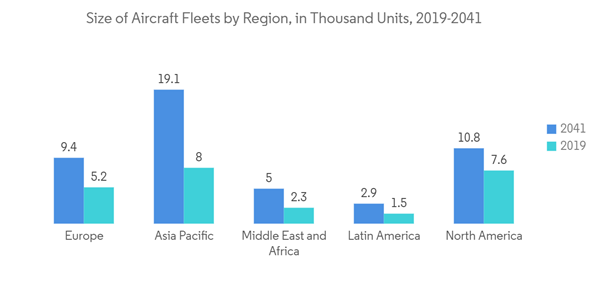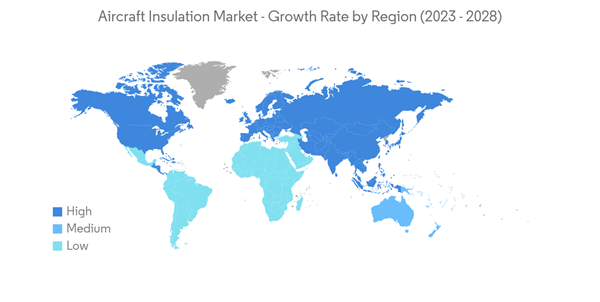To provide more safety and comfort to the passengers, the aircraft OEMs, and airlines are using different aircraft insulation materials on the aircraft, which is driving the market growth. The use of insulation materials is rapidly increasing due to advantages such as reduced vibration and noise during flyig hours. The growing use of composite materials in commercial aircraft is forecast to result in the development of a wide range of aerostructures, which are likely to have significant industrial potential. The market is likely to be stimulated by increasing demand for lightweight insulating and composite materials in commercial airplanes and business aircraft, with a view to reducing cabin noise.
Growth in aircraft sales and production, especially from the commercial segment, is generating demand for insulation systems for aircraft, thereby propelling growth in the market revenue. Moreover, stringent regulations from regulatory bodies, like the FAA, in terms of survivability and capability of the materials in various environments, are challenging the growth of the players in the market. In accordance with the US FAA's definition, all commercial aircraft must be fitted with thermal and acoustic insulation. These insulations ensure the comfort of passengers does not depend on external temperature variations and that communications are unaffected by noise generated by an aircraft. Such strict rules are making it easier for airplane manufacturers to use insulation materials in airplanes, increasing the market for aircraft insulation.
Aircraft Insulation Market Trends
The Commercial Aircraft Segment Registered the Highest Market Share
The market for the commercial aircraft segment is currently larger, which is mainly due to the high sales of the aircraft models. The air transport sector is expanding fast and is expected to continue like this over the next few years. The International Air Transport Association estimates that, until 2036, demand for air transport will increase at an annual rate of 4.3%. If that growth is achieved by 2036, the air transport sector will likely contribute 15.2 million directly employed jobs and USD 1.5 trillion of GDP to the global economy over the forecast period. On average, the usage of insulation in commercial aircraft is generally higher as compared to the other aircraft types. With the growing emphasis on increasing the passenger experience, better thermal/vibration/acoustic insulating materials are being used on the newer generation aircraft compared to the older aircraft types. The mandates imposed by EASA and FAA regarding fire-resistant thermal-acoustic insulation have propelled the growth of the insulation market for commercial aircraft. Though the newer aircraft models are the first to implement the updated mandates, older commercial aircraft have also seen some retrofitting activity in the last two years due to these regulations. With the increasing air transport demand, airlines are ordering and procuring new aircraft on a large scale. Simultaneously, with a huge order backlog with the aircraft OEMs, production rates are increasing, which will increase the demand for aircraft insulation materials. On this note, in September 2022, Ethiopian Sky Technologies inaugurated a manufacturing facility in Addis Ababa to produce insulation blankets for Boeing B737 MAX aircraft as part of a Boeing agreement (BSCA) between The Boeing Company, Geven-Skytecno and Ethiopian Airlines. Hence, the market for aircraft insulation in the commercial segment is expected to dominate the market in the future.Asia-Pacific to be the Fastest-growing Market in the Forecast Period
As passenger traffic in the region is continuously growing, airlines are adopting various growth strategies. By 2025, China is forecasted to become the world's largest aviation market in terms of air traffic; India is forecasted to develop into the world's third-largest aviation market, while other countries, such as Indonesia and Thailand, are forecasted to enter the top 10 global markets. Some of the airlines are procuring new aircraft and are expanding their routes to places where there is a growth impetus. For instance, in June 2023, Indigo (India) ordered 500 Airbus A320neo family planes at the Paris Air Show. Similarly, Air India (India) has signed purchase agreements for 250 Airbus aircraft and 220 new Boeing jets worth USD 70 billion. Air India's orders include 70 widebody planes, comprising 34 A350-1000s and six A350-900s from Airbus, 20 B787 Dreamliners, and 10 B777Xs from Boeing. It also includes 140 Airbus A320neo, 70 Airbus A321neo, and 190 Boeing B737 MAX narrowbody aircraft. The airline has also signed options to buy an additional 70 aircraft from Boeing, including 50 B737 MAXs and 20 B787 Dreamliners. For instance, Airbus A320, A330, and A350 aircraft are provided with acoustic insulation by Allied International, Triumph Aerospace Structures, and Daher. Triumph Aerospace Structures is the manufacturer of the thermal acoustic insulation systems installed onboard the Airbus A330, A350, Boeing B737, B767, B777, and Dreamliner B787 aircraft families. While DuPont Aerospace, Hi-Temp Insulation, Inc. provides fire insulation, 3M Canada provides thermal insulation for the Boeing B787 Dreamliner and the COMAC ARJ21 aircraft. Such procurement orders would drive the business prospects of the market players during the forecast period. The insulation needed for the air conditioning/heating system to economically produce cabin temperatures that appeal to the passengers varies with the airplane type and location where the aircraft operates. With most of the region lying in the hot, tropical zone, even the operators of general aviation aircraft in the region use different materials for thermal insulation to make travel comfortable for the passengers. Hence, the market is expected to grow faster in the Asia Pacific compared to the other regions.Aircraft Insulation Industry Overview
DuPont de Nemours, Inc., BASF SE, Triumph Group Inc., Boyd Corporation, and Polymer Technologies Inc. are some of the major players in the aircraft insulation market. Innovations, in terms of new insulation materials, will help the players gain new contracts. Moreover, due to the increasing emphasis on lightweight components in the aviation industry, the players are focusing on developing advanced insulation materials, mainly thermal/acoustic insulations. With the stringency of the regulations in terms of insulation safety increasing, it is becoming difficult for smaller players to penetrate into the market. The Federal Aviation Administration (FAA) is developing new flammability test requirements for aircraft insulation that will result in increased fire safety on aircraft. On this note, the product offerings of the insulation suppliers must be upgraded to suit the regulatory requirements of the governing bodies. Frequent upgrades to the product offerings based on the trends and requirements will help the players sustain the market competition in the long run. For instance, in August 2023, Ethiopian Airlines Group erected an aircraft component manufacturing plant at Kilinto Industrial Park in a joint venture with Boeing. The plant will likely manufacture various aerospace internal parts, including aircraft thermo-acoustic insulation blankets, electrical wire harnesses, and more. These internal components will be supplied to Boeing, Airbus, and an Italian aircraft manufacturing company, according to the IPDC.Additional Benefits:
- The market estimate (ME) sheet in Excel format
- 3 months of analyst support
This product will be delivered within 2 business days.










